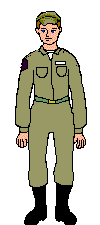Personal Interview
SSB PERSONAL INTERVIEW : HOW BODY LANGUAGE CAN MAKE OR BREAK YOUR INTERVIEW - Part 1/2
Body Posture
The experts agree that aiming for a neutral posture is your best bet. Leaning back suggests boredom or lack of interest
Leaning forward can be just as problematic, as it can seem overly solicitous or even threatening.
Standing or sitting up straight sends a message of self-assuredness—but it also makes you appear taller, which around the world is seen as a sign of smarts, confidence and credibility.
During the interview sit up straight, relax your shoulders, and fold your hands together in your lap. Some people dont know what to do with their hands, so it is best to keep them folded. Dont fold your arms across your chest. This can indicate a defensive attitude.
The posture with arms and legs crossed is called a CLOSED posture. It usually signifies a defensive or negative attitude, but beware of misinterpretation - the person may just be cold. The other posture with arms and legs uncrossed is called an OPEN posture and usually suggests a more relaxed, open attitude.
Physical Gestures
Pointing is often perceived as an aggressive motion and in some cultures is considered incredibly rude. Event off says any fast, repeated or aggressive hand gestures should be kept to a minimum.
Avoid chopping gestures chop gestures can psychologically cut up the space between you ad your interview in an aggressive way.
Enunciate your words and phrase precisely. Also, dont speak in a monotone voice- this shows a lack of enthusiasm.
Dont fidget! It can be very distracting to the interviewer if you shake your leg, play with your hair, wave your hands, click a pen, etc. Make sure to keep hand gestures to a small movement.
Make sure to show enthusiasm in the interview: smile, nod your head.


